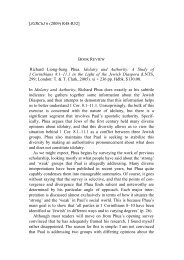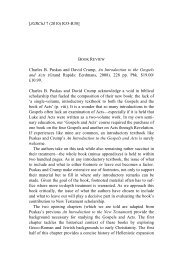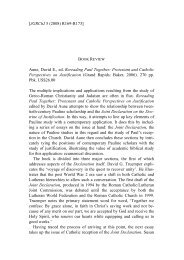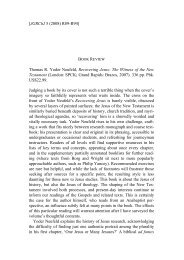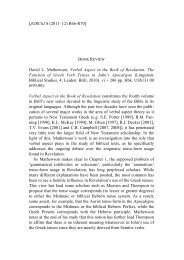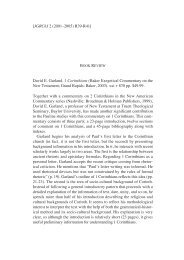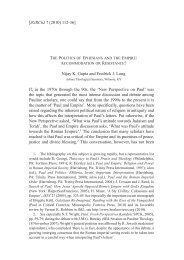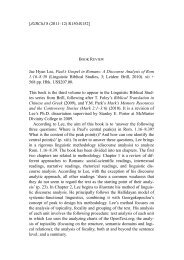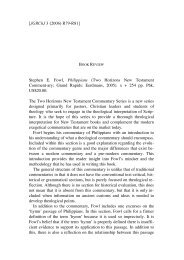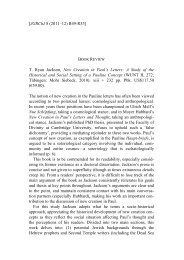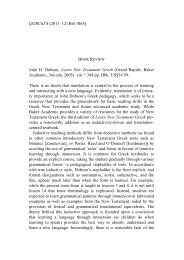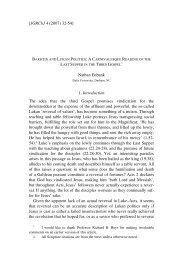John Granger Cook, The Interpretation of the New Testament in ...
John Granger Cook, The Interpretation of the New Testament in ...
John Granger Cook, The Interpretation of the New Testament in ...
You also want an ePaper? Increase the reach of your titles
YUMPU automatically turns print PDFs into web optimized ePapers that Google loves.
[JGRChJ 3 (2006) R1-R6]<br />
BOOK REVIEW<br />
<strong>John</strong> <strong>Granger</strong> <strong>Cook</strong>, <strong>The</strong> <strong>Interpretation</strong> <strong>of</strong> <strong>the</strong> <strong>New</strong> <strong>Testament</strong> <strong>in</strong> Greco-<br />
Roman Paganism (Tüb<strong>in</strong>gen: Mohr Siebeck, 2000; [repr. Peabody,<br />
MA: Hendrickson, 2002]). xvi + 385 pp. Pbk. US$24.95.<br />
It would be difficult to f<strong>in</strong>d a volume more tightly-focused on <strong>the</strong><br />
<strong>in</strong>terests <strong>of</strong> this journal, both <strong>in</strong> title and <strong>in</strong>tent, than <strong>John</strong> <strong>Cook</strong>’s latest<br />
work. Given <strong>Cook</strong>’s previous focus on <strong>the</strong> persuasive power <strong>of</strong> l<strong>in</strong>guistic<br />
structure <strong>in</strong> Mark, it is no surprise to see that he ma<strong>in</strong>ta<strong>in</strong>s a similar<br />
emphasis on persuasion; here, rhetoric is his preferred lens. ‘This<br />
book’, he proposes, ‘will hopefully contribute to an understand<strong>in</strong>g <strong>of</strong><br />
<strong>the</strong> debate between Hellenism and Christianity that resulted from <strong>the</strong><br />
Christians’ efforts at recruitment’ (p. 16). <strong>Cook</strong>’s project, while<br />
grounded <strong>in</strong> <strong>the</strong> <strong>in</strong>terpretation <strong>of</strong> Christian texts, is also a study <strong>of</strong> <strong>the</strong><br />
polemic dialogue between his sources. <strong>The</strong> world he evokes is not that<br />
<strong>of</strong> a pitched battle <strong>of</strong> pagan critique and Christian apologetics, but<br />
ra<strong>the</strong>r a war <strong>of</strong> mutual criticism, a war <strong>of</strong> propaganda.<br />
<strong>The</strong> book is <strong>in</strong> large part a survey <strong>of</strong> Hellenistic responses to <strong>the</strong><br />
sacred literature and practices <strong>of</strong> early Christianity; <strong>Cook</strong>’s acknowledged<br />
goal is to construct, whenever possible, ‘a sort <strong>of</strong> pagan’s commentary’<br />
on <strong>the</strong> <strong>New</strong> <strong>Testament</strong> texts, ‘us<strong>in</strong>g <strong>the</strong> Synoptic Gospels,<br />
<strong>John</strong>, and Paul as a structur<strong>in</strong>g mechanism’ (pp. 17, 103). His survey<br />
does not attempt a broad sampl<strong>in</strong>g, but a deep and thoughtful analysis<br />
<strong>of</strong> five consequential th<strong>in</strong>kers: Celsus, Porphyry, <strong>the</strong> pagan voice <strong>in</strong><br />
Macarius Magnes’s Apocriticus, Hierocles and Julian.<br />
<strong>Cook</strong> beg<strong>in</strong>s with rhetoric types as a po<strong>in</strong>t <strong>of</strong> entry. Students new to<br />
<strong>the</strong> tools <strong>of</strong> rhetorical and literary discourse will f<strong>in</strong>d this a helpful<br />
<strong>in</strong>troduction, though <strong>the</strong>re is also sufficient detail to hold <strong>the</strong> <strong>in</strong>terest <strong>of</strong><br />
longtime scholars; <strong>in</strong> ei<strong>the</strong>r case, <strong>the</strong> review helps <strong>Cook</strong> to establish <strong>the</strong><br />
deliberative style and <strong>of</strong>ten apotreptic (dissuasive) tone present <strong>in</strong> many<br />
<strong>of</strong> his selected texts. He also notes <strong>the</strong> Hellenistic world’s attention to
R2 Journal <strong>of</strong> Greco-Roman Christianity and Judaism 3<br />
persuasive factors found most <strong>of</strong>ten <strong>in</strong> epideictic reason<strong>in</strong>g, especially<br />
<strong>the</strong> skilful comb<strong>in</strong>ation <strong>of</strong> ἦθος (<strong>the</strong> speaker’s moral character), λόγος<br />
(<strong>the</strong> speech and its pro<strong>of</strong>s), and πάθος (emotional appeal to <strong>the</strong><br />
audience). Build<strong>in</strong>g on this <strong>in</strong>troduction, <strong>Cook</strong> addresses his five<br />
subjects <strong>in</strong> chronological order, though he <strong>of</strong>ten retraces his earlier<br />
steps to make po<strong>in</strong>ts regard<strong>in</strong>g <strong>the</strong> later critics.<br />
Celsus receives <strong>the</strong> first and most thorough treatment <strong>of</strong> <strong>the</strong> critics<br />
pr<strong>of</strong>iled. Focus<strong>in</strong>g attention on <strong>the</strong> critic’s read<strong>in</strong>g <strong>of</strong> <strong>the</strong> Gospel<br />
accounts as fiction, <strong>Cook</strong> establishes a spectrum <strong>of</strong> credibility for <strong>the</strong><br />
biblical texts, runn<strong>in</strong>g from mythical stories to literal history; this focus<br />
rema<strong>in</strong>s relevant <strong>in</strong> contemporary <strong>the</strong>ological debate. Celsus’s<br />
arguments are filtered (and possibly rearranged) through Origen <strong>in</strong><br />
Contra Celsum, so <strong>Cook</strong> must be careful when mak<strong>in</strong>g his own changes<br />
to <strong>the</strong> texts, as he does <strong>in</strong> ‘recast<strong>in</strong>g’ Celsus’s objections to follow <strong>the</strong><br />
narrative order <strong>of</strong> <strong>the</strong> Synoptic Gospels. Mat<strong>the</strong>w’s account is <strong>of</strong><br />
primary <strong>in</strong>terest to Celsus, who attacks <strong>the</strong> credibility <strong>of</strong> <strong>the</strong> life,<br />
teach<strong>in</strong>g and death <strong>of</strong> Jesus. He f<strong>in</strong>ds <strong>the</strong> resurrection distasteful and<br />
even contrary to nature; no god, as Celsus conceives <strong>of</strong> deity, would<br />
suffer such a demean<strong>in</strong>g and pa<strong>in</strong>ful death, or allow a return to life <strong>in</strong><br />
an ignoble state—for Celsus objected to <strong>the</strong> gross physicality <strong>of</strong> <strong>the</strong><br />
resurrection on philosophical grounds, and to <strong>the</strong> Gospels’ concern<br />
shown for lowly Palest<strong>in</strong>e on geographical grounds. He f<strong>in</strong>ds little <strong>of</strong><br />
value <strong>in</strong> <strong>the</strong> cross, <strong>the</strong> supposed support from <strong>the</strong> ‘mythical’ Hebrew<br />
Scriptures, or <strong>the</strong> prophetic and apocalyptic statements <strong>of</strong> <strong>the</strong> <strong>New</strong><br />
<strong>Testament</strong>. Ultimately, <strong>Cook</strong> portrays Celsus as a ‘defender <strong>of</strong> <strong>the</strong><br />
cultural consensus’ who ‘viewed his work and philosophy as a<br />
def<strong>in</strong>itive refutation <strong>of</strong> Christianity and its basis’ (pp. 99, 102).<br />
<strong>Cook</strong> f<strong>in</strong>ds an even more effective refutation <strong>in</strong> <strong>the</strong> work <strong>of</strong><br />
Porphyry. Writ<strong>in</strong>g <strong>in</strong> <strong>the</strong> third century, Porphyry constructed a polemic<br />
based on exegesis <strong>of</strong> <strong>the</strong> Christians’ Scriptures and harsh criticism <strong>of</strong><br />
<strong>the</strong>ir apologetics. Porphyry apparently admired Christ as a teacher and<br />
gave him a modicum <strong>of</strong> respect as a heroic protagonist, but he was<br />
angered by Origen’s allegorical comb<strong>in</strong>ation <strong>of</strong> Greek philosophy and<br />
Jewish religious tradition. <strong>Cook</strong> observes <strong>the</strong> charges <strong>of</strong> impiety and<br />
impropriety that flew between Christians and pagans: Porphyry<br />
identifies Christ’s teach<strong>in</strong>gs as impious and his mix<strong>in</strong>g with ‘s<strong>in</strong>ners’ as<br />
unsuitable behaviour, while Jerome later responds by label<strong>in</strong>g<br />
Porphyry, Celsus and Julian as ‘“impious” commentators’ (pp. 134-35).<br />
<strong>Cook</strong> establishes Porphyry as an exegetical critic, feared by <strong>the</strong>
Review: COOK <strong>Interpretation</strong> <strong>of</strong> <strong>the</strong> <strong>New</strong> <strong>Testament</strong> R3<br />
Christians for his ability to po<strong>in</strong>t out <strong>in</strong>consistencies <strong>in</strong> <strong>the</strong>ir attempts to<br />
harmonize <strong>the</strong> Synoptic accounts; he subsequently labels <strong>the</strong> skilled<br />
‘technique <strong>of</strong> f<strong>in</strong>d<strong>in</strong>g contradictions’ as ‘Porphyrian’ (p. 160), and<br />
locates <strong>the</strong> critic’s legacy <strong>in</strong> a furious response <strong>of</strong> Christian counterpropaganda.<br />
Students <strong>of</strong> hermeneutics will f<strong>in</strong>d ample room for<br />
analysis here, as <strong>the</strong> conflict between compet<strong>in</strong>g frameworks is seldom<br />
more historically evident. Porphyry, <strong>Cook</strong> asserts, tries to show ‘that<br />
Hellenistic culture provides more adequate grounds for understand<strong>in</strong>g<br />
texts than Christianity does’ (pp. 163-64).<br />
<strong>Cook</strong> readily admits that <strong>the</strong> pagan <strong>of</strong> Macarius’s Apocriticus may be<br />
a fictional construct, but <strong>the</strong> work still represents <strong>the</strong> most extensive<br />
example <strong>of</strong> extant pagan commentary on <strong>the</strong> <strong>New</strong> <strong>Testament</strong>; certa<strong>in</strong>ly<br />
it is also <strong>the</strong> most ‘historically obscure’ <strong>of</strong> <strong>Cook</strong>’s sources, but it<br />
rema<strong>in</strong>s important for its dual attack on <strong>the</strong> Gospel accounts and <strong>the</strong><br />
Paul<strong>in</strong>e Epistles (pp. 168-69). <strong>The</strong> length <strong>of</strong> consideration is second<br />
only to that reserved for Celsus. Macarius’s philosopher, like Celsus, is<br />
concerned with <strong>the</strong> fictional character <strong>of</strong> <strong>the</strong> Gospels, and unconv<strong>in</strong>ced<br />
by <strong>the</strong>ir attempts at historical narrative. <strong>Cook</strong> cites repeated application<br />
<strong>of</strong> ‘Porphyrian’ exegetical methods, as when <strong>the</strong> philosopher<br />
pronounces <strong>the</strong> Passion narrative to be a ‘discordant’ example <strong>of</strong><br />
‘<strong>in</strong>consistent mythmak<strong>in</strong>g (ἀσύμφωνος…μυθοποιΐα)’ (pp. 196-97).<br />
<strong>The</strong> critic po<strong>in</strong>ts out <strong>in</strong>ternal <strong>in</strong>consistencies <strong>in</strong> Paul’s writ<strong>in</strong>gs, and<br />
th<strong>in</strong>ks <strong>the</strong> apostle’s eschatology too bizarre to be credible; like Celsus,<br />
Macarius’s pagan cannot tolerate <strong>the</strong> apocalyptic nature <strong>of</strong> Christian<br />
hope, as it ‘disturbs <strong>the</strong> order <strong>of</strong> creation which should rema<strong>in</strong><br />
everlast<strong>in</strong>g (αἰώνια)’ (p. 242).<br />
Hierocles and Julian are treated only briefly, but <strong>Cook</strong> does well to<br />
evoke <strong>the</strong> historical moments <strong>in</strong> which <strong>the</strong>y wrote. Hierocles is depicted<br />
as an active persecutor, employ<strong>in</strong>g <strong>the</strong> powers <strong>of</strong> law and logic to guide<br />
Christians back to a more culturally-acceptable path. In <strong>the</strong> midst <strong>of</strong> <strong>the</strong><br />
Great Persecution <strong>of</strong> 303, his work functions as an apologetic for pagan<br />
society, us<strong>in</strong>g deliberative rhetoric as much for protreptic reason<strong>in</strong>g—<br />
preach<strong>in</strong>g <strong>the</strong> benefits <strong>of</strong> <strong>the</strong> Hellenist world and worldview—as for<br />
dissuasive argument. <strong>Cook</strong> implies a sense <strong>of</strong> desperation here. ‘One<br />
senses that paganism felt <strong>the</strong> power <strong>of</strong> Christian persuasion and needed<br />
to f<strong>in</strong>d ways to defuse <strong>the</strong> threat’, he states, and later asks whe<strong>the</strong>r <strong>the</strong>se<br />
critics could ‘feel <strong>the</strong> pillars <strong>of</strong> Olympus totter<strong>in</strong>g’ (pp. 275-76). <strong>Cook</strong><br />
wisely <strong>in</strong>vestigates Julian’s ‘apostate’ status, as his conversion from<br />
Christianity to Neo-Platonism <strong>in</strong>dicates just how unimpressed Julian
R4 Journal <strong>of</strong> Greco-Roman Christianity and Judaism 3<br />
was with Christ—and Christians. As Porphyry did before him, Julian<br />
f<strong>in</strong>ds fault with <strong>the</strong> Christian attempt to harmonize elements <strong>of</strong> Judaism<br />
and Hellenism, and he engages with deep issues <strong>of</strong> textual criticism,<br />
compar<strong>in</strong>g <strong>the</strong> Gospel accounts with one ano<strong>the</strong>r and with <strong>the</strong> traditions<br />
<strong>of</strong> Greek mythology. Julian br<strong>in</strong>gs his own experience to bear <strong>in</strong><br />
attack<strong>in</strong>g such practices as baptism, and condemns Christian attitudes<br />
regard<strong>in</strong>g <strong>the</strong> differences between <strong>the</strong>ir own worship practices and<br />
those <strong>of</strong> <strong>the</strong> pagans. He echoes Celsus’s skeptical comments on<br />
poly<strong>the</strong>ism: why should <strong>the</strong> supreme God identify with one small area<br />
such as Israel, ra<strong>the</strong>r than <strong>the</strong> whole earth? <strong>Cook</strong> skillfully highlights<br />
arguments that sound surpris<strong>in</strong>gly modern; Julian’s poly<strong>the</strong>ism is<br />
grounded <strong>in</strong> <strong>the</strong> logic <strong>of</strong> historical example, <strong>the</strong> antecedent <strong>of</strong><br />
contributions from Paul Tillich and o<strong>the</strong>r <strong>the</strong>ologians.<br />
<strong>Cook</strong>’s conclusion sums up <strong>the</strong> critics’ unfavourable response to<br />
Christianity and <strong>the</strong> <strong>New</strong> <strong>Testament</strong>, revisit<strong>in</strong>g <strong>the</strong> dist<strong>in</strong>ctions drawn<br />
between true and false, fact and fiction, <strong>in</strong> a battle <strong>of</strong> both political and<br />
religious propaganda. Seek<strong>in</strong>g to distill his f<strong>in</strong>d<strong>in</strong>gs <strong>in</strong> a coherent<br />
format, he structures his critics’ shared objections around <strong>the</strong> Apostles’<br />
Creed, form<strong>in</strong>g a sort <strong>of</strong> via negativa Pagans’ Creed. <strong>The</strong> familiarity <strong>of</strong><br />
<strong>the</strong> Creed makes it a natural choice for this f<strong>in</strong>al review, but <strong>the</strong> critics’<br />
views are taken somewhat out <strong>of</strong> context <strong>in</strong> order to formulate <strong>the</strong><br />
appropriate responses; readers are left know<strong>in</strong>g only what <strong>the</strong>se men<br />
did not believe, and little about what <strong>the</strong>y did. Given <strong>the</strong> chance, what<br />
positive statements would <strong>the</strong>y have affirmed, relative to <strong>the</strong>ir<br />
<strong>in</strong>terpretation <strong>of</strong> <strong>the</strong> <strong>New</strong> <strong>Testament</strong>, as part <strong>of</strong> a common credo?<br />
Several answers can be <strong>in</strong>ferred from <strong>the</strong> po<strong>in</strong>ts that <strong>Cook</strong> traces<br />
throughout his book. Social criticism is one such factor that gives shape<br />
to <strong>Cook</strong>’s analysis, as <strong>the</strong>se critics shared a concern over <strong>the</strong> character<br />
<strong>of</strong> Christian converts, and <strong>the</strong> likelihood <strong>of</strong> damage to <strong>the</strong> social fabric.<br />
Celsus is pictured as a ‘social conservative’, preserv<strong>in</strong>g <strong>the</strong> status quo<br />
<strong>of</strong> Hellenism; Christians deserved to be persecuted for dishonour<strong>in</strong>g <strong>the</strong><br />
emperor and <strong>the</strong> gods, for <strong>the</strong> alternative was ‘social anarchy’ (pp. 17,<br />
90). Porphyry sought to discourage conversions, and targeted Origen as<br />
an ‘apostate’ pagan (pp. 128-33). Macarius’s pagan opponent described<br />
Paul’s op<strong>in</strong>ions as uneducated, even ‘ignorant (ἀπαίδευτον)’ (p. 217).<br />
Hierocles urged ‘wayward Christians’ to repent and return to a more<br />
credible worldview, while Julian, accord<strong>in</strong>g to <strong>Cook</strong>, made it his goal<br />
to ‘reclaim <strong>the</strong> world for Hellenism’ (pp. 274, 283). Ano<strong>the</strong>r example<br />
might be <strong>the</strong> common quest to understand <strong>the</strong> content <strong>of</strong> Christianity’s
Review: COOK <strong>Interpretation</strong> <strong>of</strong> <strong>the</strong> <strong>New</strong> <strong>Testament</strong> R5<br />
sacred literature, albeit with hermeneutics decidedly different from<br />
those <strong>of</strong> <strong>the</strong> early Church. Celsus even goes so far as to formulate an<br />
‘alternative christology’ (reconstructed by <strong>Cook</strong>, pp. 69-70). <strong>The</strong>se<br />
critics read stories from <strong>the</strong> Gospels as examples <strong>of</strong> myth, conceived <strong>in</strong><br />
a manner compatible with <strong>the</strong> mythic accounts <strong>the</strong>y know. <strong>Cook</strong> is<br />
<strong>of</strong>ten forced to reconstruct arguments based on <strong>in</strong>complete texts, but his<br />
conclusions would be stronger if he took more time to tie toge<strong>the</strong>r <strong>the</strong><br />
promis<strong>in</strong>g threads that unite <strong>the</strong>se critics <strong>in</strong> a common cause.<br />
<strong>Cook</strong>’s work is an <strong>in</strong>trigu<strong>in</strong>g experiment <strong>in</strong> <strong>in</strong>tertextuality. After each<br />
section <strong>of</strong> commentary, he <strong>of</strong>fers succ<strong>in</strong>ct one-sentence summaries that<br />
serve as a digest <strong>of</strong> material recently covered; <strong>the</strong>se sections <strong>of</strong>ten refer<br />
to similar views espoused by earlier and later critics. <strong>The</strong>se <strong>in</strong>ter-critic<br />
comparisons help to build <strong>Cook</strong>’s case for a coherent debate, stretch<strong>in</strong>g<br />
across <strong>the</strong> centuries, but <strong>the</strong> ‘debate’ is only visible after <strong>the</strong> fact,<br />
through a diachronic (and at times synchronic) read<strong>in</strong>g <strong>of</strong> <strong>the</strong> pagan<br />
critics and <strong>the</strong>ir Christian counterparts. <strong>Cook</strong> pictures oppos<strong>in</strong>g sides <strong>of</strong><br />
a battlefield, with <strong>the</strong> ‘arsenal <strong>of</strong> Hellenistic literary criticism, rhetoric,<br />
historical criticism, and philosophy’ pitted aga<strong>in</strong>st <strong>the</strong> ‘extraord<strong>in</strong>ary<br />
persuasive power <strong>of</strong> ancient Christian texts and proclamation’ (p. 340).<br />
His underly<strong>in</strong>g assumption, both here and throughout <strong>the</strong> book, is that<br />
his selected critics have enough <strong>in</strong> common to be addressed as a united<br />
front aga<strong>in</strong>st Christianity. Can ‘Hellenism’ and ‘paganism’ be used<br />
<strong>in</strong>terchangeably? Can we speak <strong>of</strong> ‘<strong>the</strong> pagans’ as a cohesive and<br />
unified group?<br />
<strong>Cook</strong>, <strong>in</strong> restructur<strong>in</strong>g his subjects’ thoughts around <strong>the</strong> <strong>New</strong><br />
<strong>Testament</strong> corpus, successfully demonstrates a shared <strong>in</strong>terest <strong>in</strong><br />
underm<strong>in</strong><strong>in</strong>g <strong>the</strong> spread <strong>of</strong> Christianity; each critic is portrayed as<br />
respond<strong>in</strong>g to perceived problems and <strong>in</strong>consistencies <strong>in</strong> Christian<br />
texts. He m<strong>in</strong>es with enviable facility <strong>the</strong> overlapp<strong>in</strong>g strata <strong>of</strong> textual<br />
commentary, unearth<strong>in</strong>g facets <strong>of</strong> similar thought. Beyond this<br />
unsurpris<strong>in</strong>g overlap, his case for a common Hellenist/pagan agenda is<br />
less conv<strong>in</strong>c<strong>in</strong>g. But <strong>the</strong> author’s use <strong>of</strong> rhetoric rema<strong>in</strong>s a helpful<br />
analytical device, and readers are unlikely to f<strong>in</strong>d such a thorough and<br />
thoughtful comparison <strong>of</strong> early <strong>New</strong> <strong>Testament</strong> criticism <strong>in</strong> any o<strong>the</strong>r<br />
<strong>in</strong>dividual source. Especially for readers already familiar with <strong>the</strong><br />
structure <strong>of</strong> <strong>the</strong> <strong>New</strong> <strong>Testament</strong> canon, <strong>Cook</strong>’s text clearly provides an<br />
array <strong>of</strong> responses to Christian literature and practice <strong>in</strong> <strong>the</strong> ancient<br />
world—and illustrates Paul’s references to <strong>the</strong> message <strong>of</strong> <strong>the</strong> cross as
R6 Journal <strong>of</strong> Greco-Roman Christianity and Judaism 3<br />
scandalous, even ‘foolishness’ (1 Cor. 1.23), <strong>in</strong> <strong>the</strong> eyes and ears <strong>of</strong> <strong>the</strong><br />
Greco-Roman world.<br />
Mat<strong>the</strong>w Forrest Lowe<br />
McMaster Div<strong>in</strong>ity College



